Published
1 year agoon


On Tuesday, President Bola Tinubu outlined the procedures for a thorough examination of the current national minimum wage, which is anticipated to raise it over the current N30,000.
The committee, composed of officials from the federal government, state governments, labor unions, and the organized private sector, was launched by Tinubu in the Council Chambers of the Presidential Villa in Abuja. Tinubu was represented by Vice President Kashim Shettima.
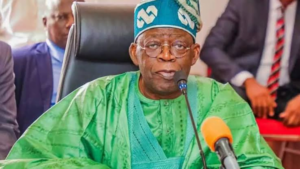
"use strict";
var adace_load_686967b897031 = function(){
var viewport = $(window).width();
var tabletStart = 601;
var landscapeStart = 801;
var tabletEnd = 961;
var content = '%3Cdiv%20class%3D%22adace_adsense_686967b896fcd%22%3E%3Cscript%20async%20src%3D%22%2F%2Fpagead2.googlesyndication.com%2Fpagead%2Fjs%2Fadsbygoogle.js%22%3E%3C%2Fscript%3E%0A%09%09%3Cins%20class%3D%22adsbygoogle%22%0A%09%09style%3D%22display%3Ablock%3B%22%0A%09%09data-ad-client%3D%22ca-pub-6593740816138858%22%0A%09%09data-ad-slot%3D%222913030144%22%0A%09%09data-ad-format%3D%22auto%22%0A%09%09%3E%3C%2Fins%3E%0A%09%09%3Cscript%3E%28adsbygoogle%20%3D%20window.adsbygoogle%20%7C%7C%20%5B%5D%29.push%28%7B%7D%29%3B%3C%2Fscript%3E%3C%2Fdiv%3E';
var unpack = true;
if(viewport
})(jQuery);
As the effects became intolerable, workers organized by the Nigeria Labour Congress (NLC) and Trade Union Congress (TUC) went on strike to make their demands known. In response, the Federal Government granted a N35,000 raise for the six months before the wage policy review.
However, Tinubu welcomed the members of the committee and congratulated them for making the Tripartite National Minimum Wage Committee list. He emphasized that the members of the committee have been carefully chosen to take on the important responsibility of renegotiating a new National Minimum Wage for workers in Nigeria.
In his own words: “Today, our sense of duty is fueled by our awareness of the precarious situations faced by Nigerian workers as well as the fact that the final Minimum Wage Instrument would expire in a few months.
The Federal Government has put the necessary procedures in place to bring together this tripartite Committee in order to map out a future that serves our interests as a group, acknowledging the need to guarantee a just and adequate living wage in accordance with the Act.
“We are aware of the short-term ramifications of the actions we have made to save the economy, even though they were unavoidable. Because we view government as a continuum, we have taken action to address the systematic bottlenecks that have hampered our economic expansion.
Since the subsidy was removed, a number of committees have been formed to investigate and advise the government on ways to mitigate the increase’s anticipated negative impacts on workers and the Nigerian people as a whole. I’m happy to report that work on putting those agreements and initiatives’ results into practice has started.
This meeting is the result of discussions held by one of the Technical Committees, which comprised members from the government and organized labor. We have determined that the National Minimum salary has to be reviewed, and we also need to think about setting a minimum salary that will help the country.
I am happy that the proposal is being implemented today, and I think we can all agree that this is consistent with our democratic system and respect for the law. I would want to thank everyone who helped with that endeavor.
“All stakeholders are included in this new National Minimum Wage Committee, considering its broad membership scope. I now direct that Ministers and the Head of the Federation’s Civil Service personally attend the meeting, acknowledging the importance of this initiative and ensuring a significant level of participation.
In the event that they are unable to attend, their Permanent Secretaries will attend on their behalf. Governors are also expected to attend in person or, if needed, through their Commissioners.
I implore you to give the question of a national minimum wage and all associated issues careful thought, taking into account the effects on the economy of the nation as well as the wellbeing of our workforce.
The President clarified that the 1999 Federal Republic of Nigeria Constitution’s (as amended) Exclusive Legislative List addresses the matter of a National Minimum Wage for the Federation.
He informed the committee that, taking into account the sustainable payment capacity of all tiers of government as well as other employers or enterprises, the goal should be to transcend the basic Social Protection Floor for all Nigerian workers.
“I voice this opinion because I believe that the minimum wage should be based on social justice and equity since it is the least amount of money that an employee should be paid for their effort. I’m hoping that the decisions you make will be mutually agreeable and suitable to both sides.
The government’s choice will be brought before the National Assembly as an Executive Bill after taking into account your final suggestion. With the support of employers in the corporate sector and state governments, this bill will be carefully examined by lawmakers before becoming a law.
In light of the fundamental provisions of the Minimum Wage Fixing Convention No. 131 of the International Labour Organization and the Minimum Wage Fixing Machinery Convention No. 26, both of which Nigeria has ratified, I hope the Committee will apply the principles of full consultation with Social Partners and their direct participation.Accordingly, in the spirit of tripartism and collective bargaining agreements, the circumstances of true social dialogue ought to exist.
As a result, I urge everyone to recognize one another, participate in constructive collective bargaining, and uphold a give-and-take mentality.
In addition, as you proceed with your recommendation for a new National Minimum Wage, kindly carry on with your consultations beyond the Committee.
It is expected that the Committee will expeditiously wrap up its discussions and turn in its findings and recommendations. For the appropriate procedures to be started in order to adopt a new National Minimum Wage, this timely submission is essential. The Committee has been tasked with completing its given duty on schedule, and the Hon. Minister of Finance and Coordinating Minister of the Economy have been directed to provide the necessary finances and logistics.
“The Committee is anticipated to conclude its deliberations promptly and submit its report and recommendations. This timely submission is crucial to initiate the necessary processes for implementing a new National Minimum Wage. The Hon. Minister of Finance and Coordinating Minister of the Economy has been instructed to allocate the essential funds and logistics to the Committee, facilitating the timely completion of its assigned task.
He stated that since the fuel subsidy was removed—which he characterized as an essential step toward long-term fiscal sustainability—Nigeria has faced serious economic difficulties over the past year.
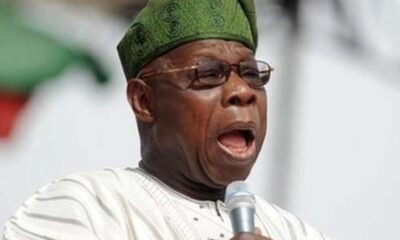

Consult With Zimbabwe, Obasanjo Advises The Tinubu Government
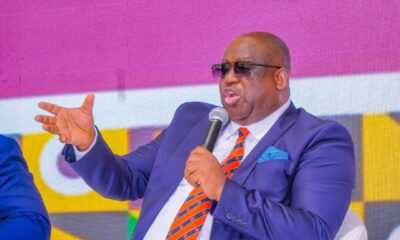

Gov Mutfwang: Buhari Sold Nigeria’s Future
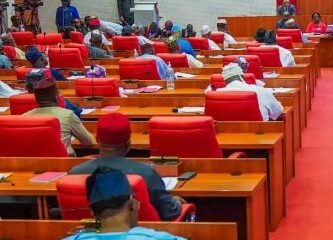

Sen. U-turns And Approves Bill To Prolong The Tenure of National Assembly Employees
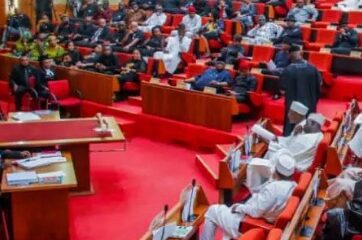

Senate Approves Four Candidates For CBN’s Board Of Directors


Police Find The Body of Barrister Chris Agidy, Ned Nwoko’s kidnapped Aide
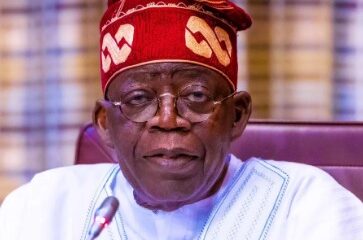

Complete List Of Commissions, Agencies, And Parastatals That Will Be Dissolved, Combined, Moved, Or Absorbed


















JOIN OUR WHATSAPP CHANNEL